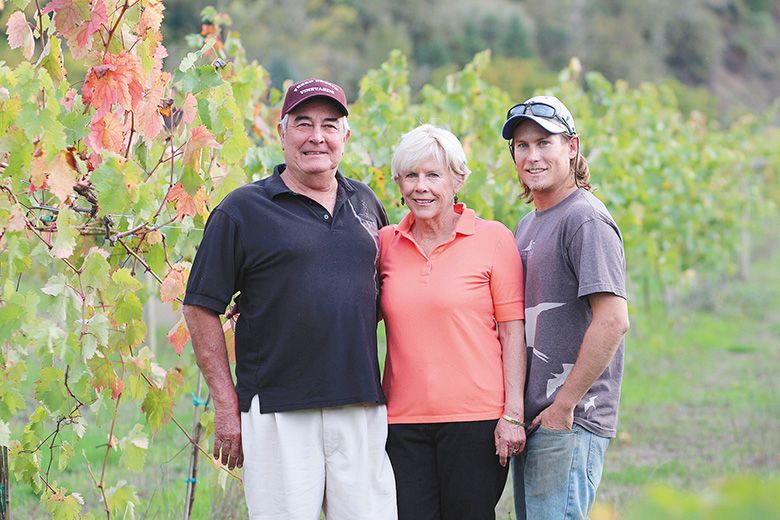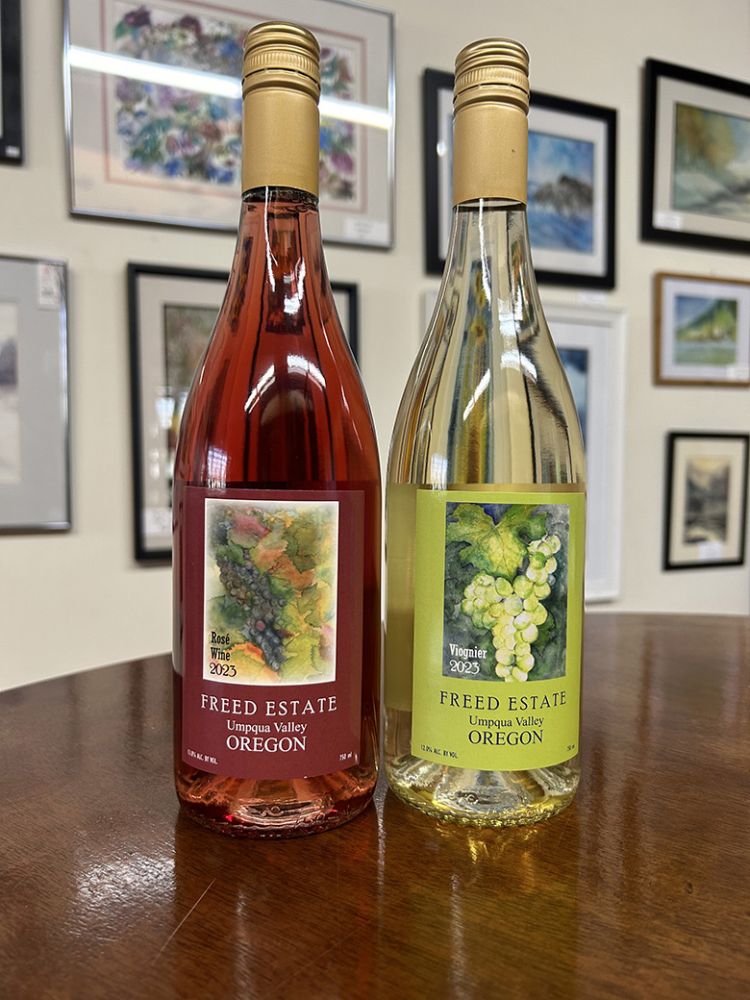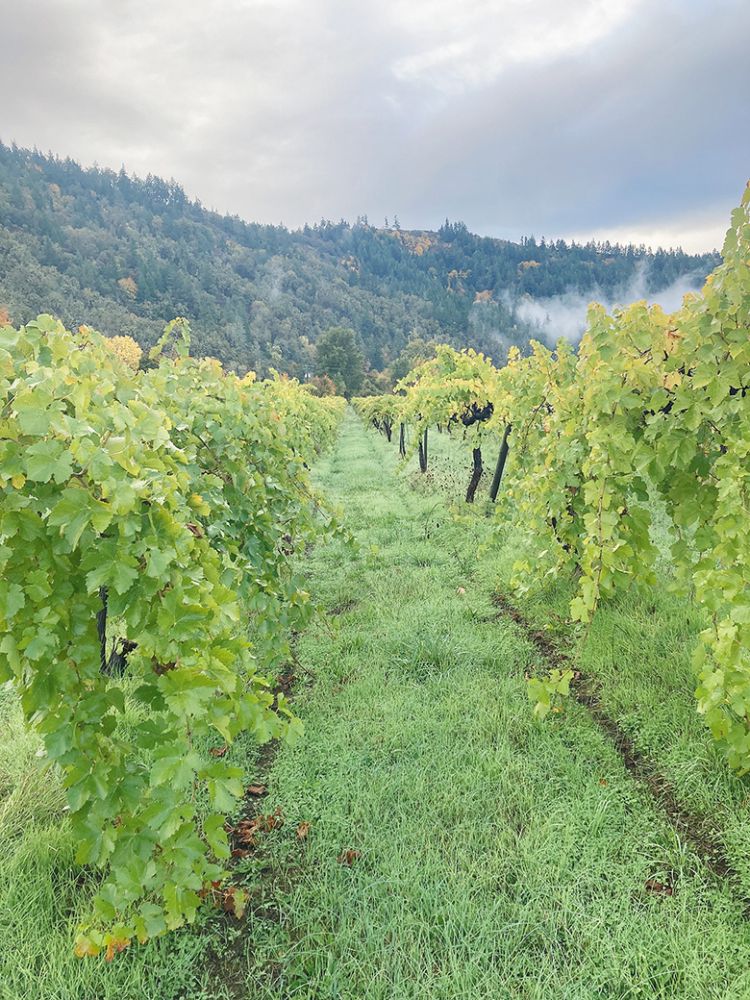Huakaʻi Waina
How one family pours their aloha spirit Into Oregon wine



By Aakanksha Agarwal
It all began when a Hawaii-born couple fell in love with the feel of Oregon dirt under their fingernails. When Mike and Pam Freed visited her sister in Southern Oregon, their casual family stay gradually grew into a life-changing epiphany. The couple was captivated by the grounded simplicity of rural life: driving tractors, harvesting vegetables and talking with neighbors at the farm stand.
Mike, a wine lover with a penchant for new beginnings, began to dream of retiring into farming. Not long afterward, when a parcel of land near the family farm came up for sale, he realized his opportunity and took it.
At the time, their son Bryan left for Southern Oregon University in Ashland. He was drawn to the forests, lakes, and proximity to the Pacific Ocean. Eventually, Bryan returned to Hawaii. “I will always love Hawaii, and thoroughly enjoyed growing up there,” he admits. “But I started to miss Oregon… the forests, mountains, lakes, rivers and rugged coastline.”
When Bryan arrived again in Oregon, it was with a purpose. His parents had planted a vineyard with help from local viticulturists and family members. He sought a way to be involved. “I wanted to be a part of the family vineyard and realized I could be helpful if I studied viticulture,” he says. He enrolled at Oregon State University.
This year, Freed Estate Vineyards celebrates its 25th anniversary, guided by values Bryan refers to as the “Spirit of Aloha.” He explains, “These values include warm hospitality, love, compassion and respect for others, as well as a deep connection and harmony with the land. They also emphasize humility and gratitude. We try to reflect these qualities in everything we do.”
Bryan assumed a more active role after his father died. “There was a lot to learn; there still is. I enjoy the challenge more than I expected,” he admits.
Bryan’s initial memories as a vineyard manager involve hard labor, grueling days– and a surprising amount of humor. “During the day, friends from college and I moved irrigation, built trellises and trained vines to the wire. We would camp next to the vines at night. Then there was the construction of our winery and tasting room building. We moved a barn from another vineyard onto ours. In the early days, irrigation meant dragging heavy pipes by hand, often barefoot, because the mud would eat your shoes.”
Bryan recalls, “It was exhausting, yet rewarding. You really get to know your land that way.”
Winemaking has its own comic moments, too. He still laughs thinking of when a cellar mishap left someone completely soaked in red wine. Some moments are deeply personal. Bryan was married at the vineyard, surrounded by the vines his family planted. “It was the last big hurrah my dad got to experience,” he shares. “I’m so happy he got to spend that time with his family.”
The vineyard lies adjacent to the South Umpqua River running at the base of Roberts Mountain. The site is a convergence point of climate and geology. The river moves air through the vines, while ancient floods left a legacy of cobblestone-rich soils. “I like to think the river and mountain work together to circulate air through the vineyard,” notes Bryan.
The rare overlap of coastal and inland weather systems delivers complexity along with unpredictability. This can create challenges, but also infuses a character and terroir specific to Freed Estate, according to Bryan.
From the outset, the Freeds prioritized sustainability. However, protecting the land, mālama ka ‘āina, as the Hawaiian value translation, isn’t solely about sustainability. Their approach is personal: Bryan’s father and other family members have faced serious illnesses, possibly a result of chemical exposure.
“We are farming and using this land with our family and friends. We don’t want to expose anyone to unnecessary or potential hazards,” he says. Instead of herbicides, they farm with sheep and shovels. Integrating pest management, hand-farming and minimal intervention practices.
That philosophy continues in the winery. Bryan uses gravity racking off the lees, avoiding unnecessary additives and minimal filtration to preserve each wine’s natural character. “It begins with growing high-quality grapes. You might notice a bit of natural sediment in the bottle, or a rosé with a hue closer to orange than pink,” he explains. “That’s because we believe in preserving the character of the wine, not filtering it out.”
Over the years, they’ve refined what grows best. “We reduced acreage of harder-to-ripen varieties,” Bryan notes. “You know what grapes to champion when you keep selling out of its wine. Our Viognier is one of those.”
Tending the Viognier is a family affair and only the most trusted hands are allowed near it. They also hope to plant more in the future. But Bryan’s heart truly belongs to Syrah. “It was the first variety that ‘spoke to me,’ triggering my brain to give words to what I was tasting and smelling.”
Beyond Syrah, Freed Estate produces smaller lots of Tempranillo, Merlot and Cabernet Sauvignon.
The “spirit of aloha” is in every handshake, every pour, every vine lovingly tended without shortcuts. Freed Estate’s participation in the Harvest Hosts program has helped transform the property into a welcoming space for curious travelers, often RVers discovering Oregon wine country for the first time. “People can go on a self-guided tour of a viticultural area and always have a place to stay. My mom loves popping into the tasting room to chat with travelers and find out where they are from.”
Bryan has also stepped into the community role once occupied by his father. In addition to donating wine to local fundraisers, he joined the board of the Winston-Dillard Melon Festival, the area’s longest-running celebration. Bryan feels proud to carry on the tradition of generosity. “I want to help my community and continue making this a nice place to live,” he shares.
He’s also grateful for the camaraderie of the local wine scene. “One thing I love about Umpqua Valley’s wine industry is how cooperative we are,” he shares. When he once faced a confusing vineyard nutrient issue, Carlos Figueroa of Wild Rose Vineyard helped him resolve it. Today, Bryan returns the favor by fielding questions, diagnosing vine issues and offering advice to others.
Despite the winery’s understated reputation, there exists quiet ambition. Bryan wants to continue refining sustainability efforts, planting more of what works and adapting to the rhythms of the land rather than forcing it.
“My hope for Freed Estate is we keep growing,” he states.
“I hope we have opportunities to expand our vineyard and continue to move toward more sustainable practices. I hope more people experience our wines and our ‘aloha spirit.’ I am very grateful to be able to continue my family’s journey and hope to do so for a long time to come.”
Freed Estate Winery
430 Hooten Rd, Winston
(808) 551-9998
Thursday–Sunday, 1–5 p.m.
Monday–Wednesday, by appt.
www.freedestatewinery.com
Aakanksha Agarwal is a wine, travel and lifestyle writer from India. Formerly a Bollywood stylist, she now resides in the U.S., embracing writing full-time while juggling family life and indulging in her passions for cuisine, literature and wanderlust.










